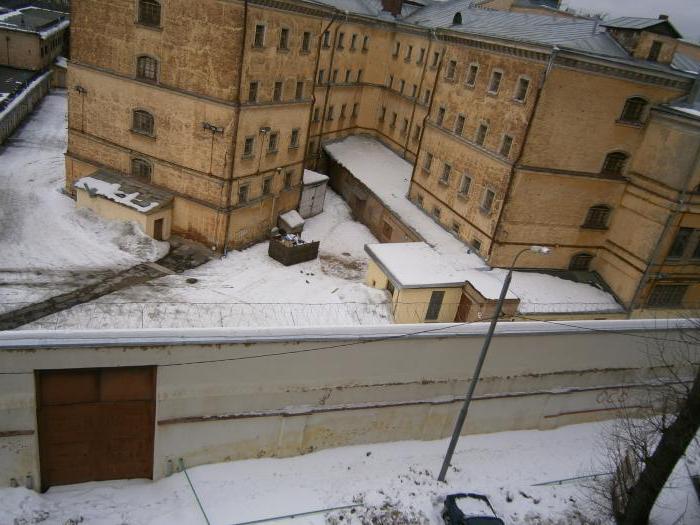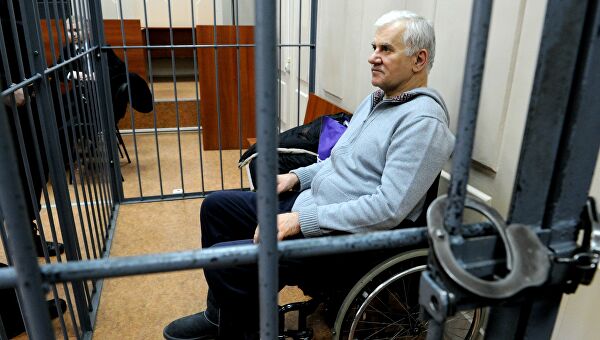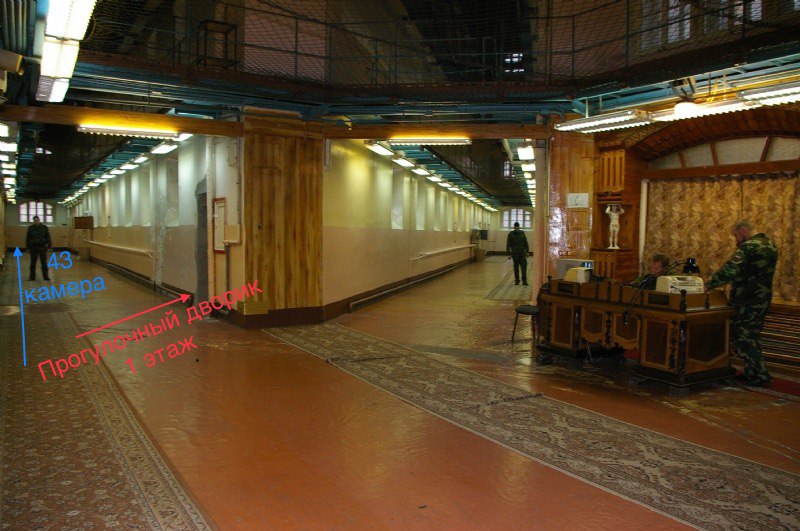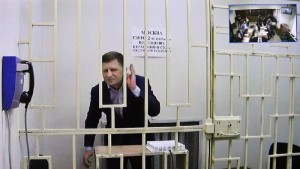Source: www.rucriminal.info
The VChK-OGPU Telegram channel and Rucriminal.info continue a series of publications with the memories of a person who spent three years in the Lefortovo pre-trial detention center. Today, exclusively for our publication, the former prisoner will talk about the second day of his stay in this prison shrouded in secrets. You can read about the first day here.
SECOND DAY
Usually in "Lefortovo" the hang-up is announced at 22:00 according to the internal regulations. It is interesting that in other pre-trial detention centers there is no such thing as "retreat". There is an evening check from 6-7 pm, and after - life is just beginning. (At least that was the case in Butyrka, where I was sitting before).
The essence of the checks is as follows: the entire cell is taken out to the continuation (corridor), the attendant goes inside, checks the bars with a wooden hammer, asks if there are any complaints, and sometimes counts the number of convicts to check with the card, you never know, suddenly someone ran away. Sometimes there are 30-40 people in the cells, and imagine, all this sleepy crowd first stomps on the continuation, and after 2-3 minutes back to the cell, and so the whole central, twice a day. In my new shelter, there are no such checks. So, at 22 o'clock they announced a hang-up. That first night in Lefortovo, I hardly slept a wink. The change of the noisy camera "Butyrka", which was walking all night long, had an effect on this deathly silence, coupled with the light that never turns off.
MORNING
At 6:00 in the morning, the radio blared at full volume, which, it turns out, is in every cell. I immediately jumped up and wanted to turn it off. But, surprisingly, it could only be subtracted. This morning "Business FM" was broadcasting.
My cell is practically the first from the edge, from which the prison staff began to wake everyone. The feeding trough (a window for feeding food, documents) opened, a face unknown to me calmly muttered: "Good morning, we make the bed, letters, complaints, do you need to see a doctor?"
And if you need to submit any applications in writing, make an appointment with a doctor or the library, you inform the staff, they write in a notebook and a doctor or librarian must approach the prisoner.
The morning in the cell is usually very cold, even in summer. Because the walls in the pre-trial detention center are made of stone, and the room is almost always dubak, sometimes in the summer you don't even need an air conditioner. It's hard for me to crawl out from under the covers and lie on the surface of the made bed, being sleepy, but you get used to everything, and even here the Russian ingenuity produces its own "know-how", which I will talk about later. The employee does not leave the trough until the inmate makes the bed. And only then he hurries to wake up the others.

In my opinion, making beds is not an observance of the regime or the law, but rather one of the drops of artificially created stress that haunts all the inmates of these walls; breaking the law or breaking the rules is possible only when an investigator or operatives are involved, before the law they are , as we know, smoother.
"INDIVIDUAL APPROACH"
In all other institutions of the Federal Penitentiary Service, prisoners are a mass, with whom they work, as with a group of people who have leaders, in the form of beholders. There are no masses in Lefortovo, each prisoner here is individual, and for one prisoner to build a ramp, as for Said Amirov, it is impossible, it seems to me, in any other pre-trial detention center or colony.

My eyes personally saw how an old man without legs, above knees, which we often see on the streets of Moscow - beggars with stumped legs, crawled along the continuation in another pre-trial detention center. The picture remained in my mind for a lifetime, all the care for such unfortunates in ordinary pre-trial detention centers falls on other prisoners who help poor disabled people who have fallen into the millstones of the system, they are given cigarettes, help out in all other household needs, but in Lefortovo - everyone the caretaker is individual, each client has its own approach, its own methods of influence. If he needs to be broken, they will break him, he needs to sit quietly - they will make him sit and not rampage, they need testimony from him - for them this is another client, they know how to bend and persuade, not torture, no, mops for these walls - this is the past, in this they have definitely gone far ahead.
BREAKFAST
Breakfast starts at 7:00. They offered semolina porridge, for a long time I have not eaten this delicacy from the past, it here, as it turned out, is always sweet. I got hooked on some cereals in the pre-trial detention center and still eat them. That morning I tasted sweet semolina for the first time. They also gave tea or boiling water to choose from.
Unlike other isolation wards, the food at Lefortovo is really edible. In other institutions, gruel is used so as not to starve to death, but here you can eat it with pleasure. Plus the bread is given - the famous "Moscow cut loaf", or black "Borodinsky" - delicious, in other detention centers they make bread themselves, and it is terrible, after a day of storage it is no longer possible to eat it, as we know, it is often used to make beads or other souvenirs modern GULAG. After breakfast, the feeder opens and a man comes in, with big lips with a puffy face, and wearing glasses. It was Monday, probably the weekend went well, his name was Andrey, as it turned out later. Employee names, by the way it turns out only when they turn to each other, and so none of them will say their name for anything.
STROLL

An employee named Andrei offered to go for a walk, I agreed, and at 8 in the morning they took me for a walk. Since my cell was at the beginning of the longitudinal floor on the first floor, I was led first. “Hands behind your back,” Andrey muttered gloomily. For me, Lefortovo was like the Louvre museum, in which I was shortly before my arrest, so I wanted to see and discern as many details as possible and looked zealously around and at the ceiling, which Andrei remarked to me so that he could only look straight ... There is a balcony on each floor, and there is a grid between the floors so that it would not occur to anyone to jump off, this is a huge four-story building, and from the first floor you can see a distant ceiling, and on the sides there are cameras. After walking along the corridor for about 30 meters, there is a passage on the left, where Andrei accompanies, and a descent down the stairs and a narrow corridor, and on the sides of the door, and now they lead me into the so-called walking yard.
Music plays here and nothing but music is heard. A promenade for a person from the outside is probably imagined as a real place where you can walk. But I dare to upset, from the idea of a walking person, there is only fresh air. This room is in the form of a trapezoid, at the widest end it is 2 meters, at the opposite end it is 1.5 meters, and 6 meters long, and in the middle of the courtyard there is a small bench that you have to bypass when you walk, and if you walk together, it rather serves as a separator space so that everyone can walk in this confined space. The walls are covered with rough plaster so that there is no opportunity to write on the walls, and a stern employee walks from above, whose name I did not recognize. During all three years of walking, I did not see any of his emotions on his face. By the way, many were like that there, and most of them were former KGB officers transferred to the subordination of the Federal Penitentiary Service, but whose career ladder is 100% dependent on the Lubyanka, and not on Zhitnaya. The internal regulations stipulate a walk, and in which rooms it should be, is not spelled out anywhere, and even if the yard is meter by meter, it will not embarrass anyone, and you will be taken out "to walk there too," although what they called a walking yard rather looks like an animal enclosure.
PRISONERS SHOULD NOT SEE EACH OTHER
The duration of the walk is one hour, and then, in turn, all the prisoners are taken back from the courtyards to their cells. One walking shift has about 20 people, during the day it is possible to make sure that no inmate sees another inmate in the corridor or anywhere else, this is so well established that I can say that in three years, I did not meet there by chance not with one person and moreover, if it happens that they find out that they know who is in which cell, they transfer this cell to another.
Not to allow prisoners to cross each other - for them this is one of the most important rules, there is probably a hidden, geebish meaning in this. I was brought back to my cell. After a walk in the cell, there are always unpleasant smells that you do not feel when you are there all day. It was Monday and usually it is an active day, they carry letters, papers, sentences and all possible correspondence that has accumulated since Friday.
During the day I walked alone in my cell and thought. After dinner, I was asked to pack my things that I didn’t have. When I was ready, the doors opened, on the longitudinal side there was a cart, where I could put the mattress and all the belongings that remained.
NEW CAMERA AND MEETING A NEIGHBOR
I was taken to a cell where an Asian was sitting, and the first thing I asked was his name and article. It turned out that the people's article "228" and plus the smuggling of heroin, which was a shock for me, because usually in "Lefortovo" there are extremists and spies.
It was evening in Moscow. People in the wild were in a hurry at this time from work, the capital shone and fled, life in freedom was in full swing. Well, I, having settled down with my new cellmate, drank tea from a modest income from his reserves. And so we started getting to know each other.
To be continued
Maria Groznya
Source: www.rucriminal.info






